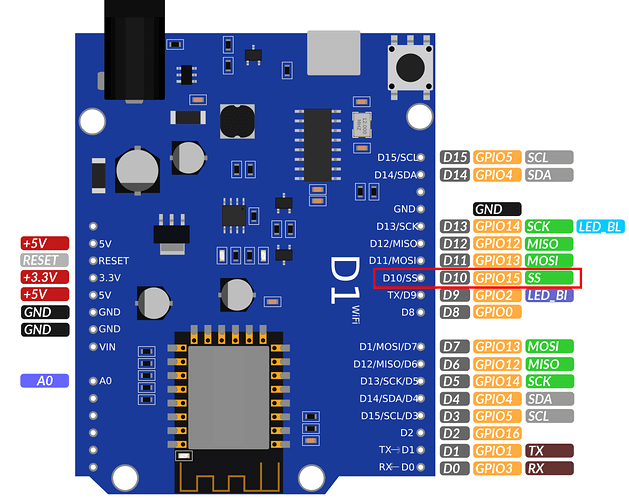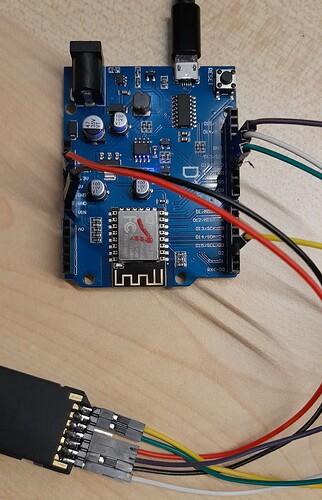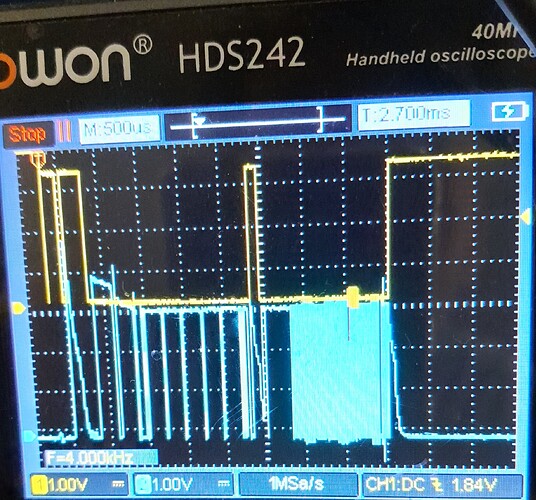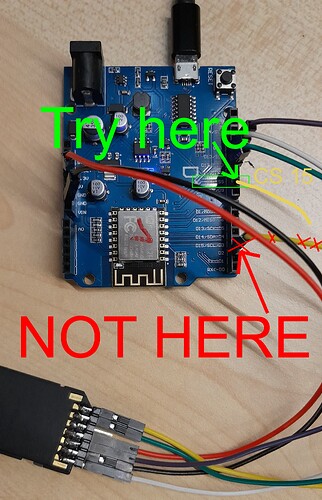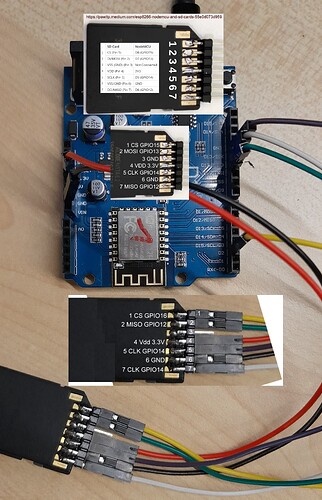Has anyone experience with this board and communication to SD cards?
It is a ESP8266-based board. So any code written for ESP8266 that stores data on an SD-card will work.
You will have to find the correct IO-pins. This Ardino-Uno Formfactor board is rather rarely used.
Post a link to the Pinout description.
Then users can help to find out which SD-card pin must be connected to which IO-pin.
You should buy a quality SD-card-reader.
In my experience the $1,50 modules do not work reliably.
So don't buy them at aliexpress or banggood. Buy one from Sparkfun oder Adafruit
best regards Stefan
Hi Stefan. I checked the connection hundred times. The ESP sends as message to the SD and it answers on the MISO. With my simple oscilloscope I see the pulses, but I cannot decode the message as professional Oscis can do. Its looks very similar to the pulses coming out, when I use a UNO successfully.
please post the complete sketch that you used for testing writing to sd-card.
Without the sketch nothing will going on towards a solution.
There are various functions for testing almost every detail about writing / reading to an SD-card. Starting with a test if mounting was successfull.
best regards Stefan
Hi Stefan
It's rather nothing.
/*
SD card datalogger
This example shows how to log data from three analog sensors
to an SD card using the SD library.
The circuit:
analog sensors on analog ins 0, 1, and 2
SD card attached to SPI bus as follows:
** MOSI - pin 11
** MISO - pin 12
** CLK - pin 13
** CS - pin 15
created 24 Nov 2010
modified 9 Apr 2012
by Tom Igoe
This example code is in the public domain.
*/
#include <SPI.h>
#include <SD.h>
const int chipSelect = 16;
void setup() {
// Open serial communications and wait for port to open:
Serial.begin(115200);
Serial.print("Initializing SD card...");
Serial.println ();
// see if the card is present and can be initialized:
if (!SD.begin(chipSelect)) {
Serial.println("Card failed, or not present");
// don't do anything more:
return;
}
Serial.println("card initialized.");
delay (2000);
}
void loop() {
// // make a string for assembling the data to log:
// String dataString = "";
// // read three sensors and append to the string:
// for (int analogPin = 0; analogPin < 3; analogPin++) {
// int sensor = analogRead(analogPin);
// dataString += String(sensor);
// if (analogPin < 2) { dataString += ","; }
// }
// // open the file. note that only one file can be open at a time,
// // so you have to close this one before opening another.
// File dataFile = SD.open("datalog.txt", FILE_WRITE);
// // if the file is available, write to it:
// if (dataFile) {
// dataFile.println(dataString);
// dataFile.close();
// // print to the serial port too:
// Serial.println(dataString);
// }
// // if the file isn't open, pop up an error:
// else { Serial.println("error opening datalog.txt"); }
}
What is "nothing"
Unprecise description.
The more details you post the better the analysis can be.
What does the serial monitor show?
Post a picture of your SD-card-module
Post a link to the datasheet of your SD-card-module
Post a schematic how you connected the SD-card
Do you have a 24 MHz 8 ch logic analyser? They cost about $15
There is a software called sigrok pulseView that can record 8 channels
and has even a protocol analyser.
best regards Stefan
the code say in the comment
you defined
In this documentation Chip-Select ("SS") is IO-Pin 15 and not 16
so try
const int chipSelect = 15;
Here is a demo code that tests the FS-library (FileSystem)
#include "FS.h"
#include "SD.h"
#include "SPI.h"
void listDir(fs::FS &fs, const char * dirname, uint8_t levels){
Serial.printf("Listing directory: %s\n", dirname);
File root = fs.open(dirname);
if(!root){
Serial.println("Failed to open directory");
return;
}
if(!root.isDirectory()){
Serial.println("Not a directory");
return;
}
File file = root.openNextFile();
while(file){
if(file.isDirectory()){
Serial.print(" DIR : ");
Serial.println(file.name());
if(levels){
listDir(fs, file.name(), levels -1);
}
} else {
Serial.print(" FILE: ");
Serial.print(file.name());
Serial.print(" SIZE: ");
Serial.println(file.size());
}
file = root.openNextFile();
}
}
void createDir(fs::FS &fs, const char * path){
Serial.printf("Creating Dir: %s\n", path);
if(fs.mkdir(path)){
Serial.println("Dir created");
} else {
Serial.println("mkdir failed");
}
}
void removeDir(fs::FS &fs, const char * path){
Serial.printf("Removing Dir: %s\n", path);
if(fs.rmdir(path)){
Serial.println("Dir removed");
} else {
Serial.println("rmdir failed");
}
}
void readFile(fs::FS &fs, const char * path){
Serial.printf("Reading file: %s\n", path);
File file = fs.open(path);
if(!file){
Serial.println("Failed to open file for reading");
return;
}
Serial.print("Read from file: ");
while(file.available()){
Serial.write(file.read());
}
file.close();
}
void writeFile(fs::FS &fs, const char * path, const char * message){
Serial.printf("Writing file: %s\n", path);
File file = fs.open(path, FILE_WRITE);
if(!file){
Serial.println("Failed to open file for writing");
return;
}
if(file.print(message)){
Serial.println("File written");
} else {
Serial.println("Write failed");
}
file.close();
}
void appendFile(fs::FS &fs, const char * path, const char * message){
Serial.printf("Appending to file: %s\n", path);
File file = fs.open(path, FILE_APPEND);
if(!file){
Serial.println("Failed to open file for appending");
return;
}
if(file.print(message)){
Serial.println("Message appended");
} else {
Serial.println("Append failed");
}
file.close();
}
void renameFile(fs::FS &fs, const char * path1, const char * path2){
Serial.printf("Renaming file %s to %s\n", path1, path2);
if (fs.rename(path1, path2)) {
Serial.println("File renamed");
} else {
Serial.println("Rename failed");
}
}
void deleteFile(fs::FS &fs, const char * path){
Serial.printf("Deleting file: %s\n", path);
if(fs.remove(path)){
Serial.println("File deleted");
} else {
Serial.println("Delete failed");
}
}
void testFileIO(fs::FS &fs, const char * path){
File file = fs.open(path);
static uint8_t buf[512];
size_t len = 0;
uint32_t start = millis();
uint32_t end = start;
if(file){
len = file.size();
size_t flen = len;
start = millis();
while(len){
size_t toRead = len;
if(toRead > 512){
toRead = 512;
}
file.read(buf, toRead);
len -= toRead;
}
end = millis() - start;
Serial.printf("%u bytes read for %u ms\n", flen, end);
file.close();
} else {
Serial.println("Failed to open file for reading");
}
file = fs.open(path, FILE_WRITE);
if(!file){
Serial.println("Failed to open file for writing");
return;
}
size_t i;
start = millis();
for(i=0; i<2048; i++){
file.write(buf, 512);
}
end = millis() - start;
Serial.printf("%u bytes written for %u ms\n", 2048 * 512, end);
file.close();
}
void setup(){
Serial.begin(115200);
while (!Serial) {
; // wait for serial port to connect. Needed for Leonardo only
}
Serial.println("Setup-Start");
PrintFileNameDateTime();
Serial.println("Mounting SD-Card");
if(!SD.begin(5)){
Serial.println("Card Mount Failed");
return;
}
uint8_t cardType = SD.cardType();
if(cardType == CARD_NONE){
Serial.println("No SD card attached");
return;
}
Serial.print("SD Card Type: ");
if(cardType == CARD_MMC){
Serial.println("MMC");
} else if(cardType == CARD_SD){
Serial.println("SDSC");
} else if(cardType == CARD_SDHC){
Serial.println("SDHC");
} else {
Serial.println("UNKNOWN");
}
uint64_t cardSize = SD.cardSize() / (1024 * 1024);
Serial.printf("SD Card Size: %lluMB\n", cardSize);
listDir(SD, "/", 0);
createDir(SD, "/mydir");
listDir(SD, "/", 0);
removeDir(SD, "/mydir");
listDir(SD, "/", 2);
writeFile(SD, "/hello.txt", "Hello ");
appendFile(SD, "/hello.txt", "World!\n");
readFile(SD, "/hello.txt");
deleteFile(SD, "/foo.txt");
renameFile(SD, "/hello.txt", "/foo.txt");
readFile(SD, "/foo.txt");
testFileIO(SD, "/test.txt");
Serial.printf("Total space: %lluMB\n", SD.totalBytes() / (1024 * 1024));
Serial.printf("Used space: %lluMB\n", SD.usedBytes() / (1024 * 1024));
}
void PrintFileNameDateTime() {
Serial.println( F("Code running comes from file ") );
Serial.println( F(__FILE__) );
Serial.print( F(" compiled ") );
Serial.print( F(__DATE__) );
Serial.print( F(" ") );
Serial.println( F(__TIME__) );
}
// easy to use helper-function for non-blocking timing
boolean TimePeriodIsOver (unsigned long &startOfPeriod, unsigned long TimePeriod) {
unsigned long currentMillis = millis();
if ( currentMillis - startOfPeriod >= TimePeriod ) {
// more time than TimePeriod has elapsed since last time if-condition was true
startOfPeriod = currentMillis; // a new period starts right here so set new starttime
return true;
}
else return false; // actual TimePeriod is NOT yet over
}
unsigned long MyTestTimer = 0; // Timer-variables MUST be of type unsigned long
const byte OnBoard_LED = 2;
void BlinkHeartBeatLED(int IO_Pin, int BlinkPeriod) {
static unsigned long MyBlinkTimer;
pinMode(IO_Pin, OUTPUT);
if ( TimePeriodIsOver(MyBlinkTimer,BlinkPeriod) ) {
digitalWrite(IO_Pin,!digitalRead(IO_Pin) );
}
}
void loop() {
BlinkHeartBeatLED(OnBoard_LED,250);
if ( TimePeriodIsOver(MyTestTimer,1000) ) {
}
}
best regards Stefan
Hi Stefan
I do not update the comments, when I play with the port number.
here more details:
this is the CS (yellow) and the MISO. It only comes, if a card is inserted. The zhe data lines should be correct. Also the 3.3V level is ok.
And here is my simple hardware setup.
I tried 2 different SD cards. Both work with the UNO board.
Thaks for the hint with the logic analyzer. In my job (now retired) I only worked with professional tools of e.g. Tektronix for many thousand €. So I have no experience cheap "toys". Unfortunately the sigrok page is actually not available. So I will try to find a different part. I looks very helpful.
Did you noticed that the orighinal demo-codes use
GPIO-Pin 15
There are some more differencies between your wiring and how this tutorial wired it
best regards Stefan
I googled for PulseView-Download and found this thread on stacloverflow
which shows where you still can download pulseView
https://web.archive.org/web/20201101141813/https://sigrok.org/jenkins/job/sigrok-cross-mingw/buildtype=static,debugtype=release,platform=cross-i686-w64-mingw32/lastSuccessfulBuild/artifact/pulseview-NIGHTLY-32bit-static-release-installer.exe
Thanks, I tried several download links, mine always failed. This links is ok.
For my problem: I have exactly the same wiring as you proposed. But still "not present"
I did not really see what is connected to what because your picture is not taking from vertically above.
It took me a long time to verify this. In future I will allways ask for a picture from verticaly above before analysing anything
This topic was automatically closed 180 days after the last reply. New replies are no longer allowed.

